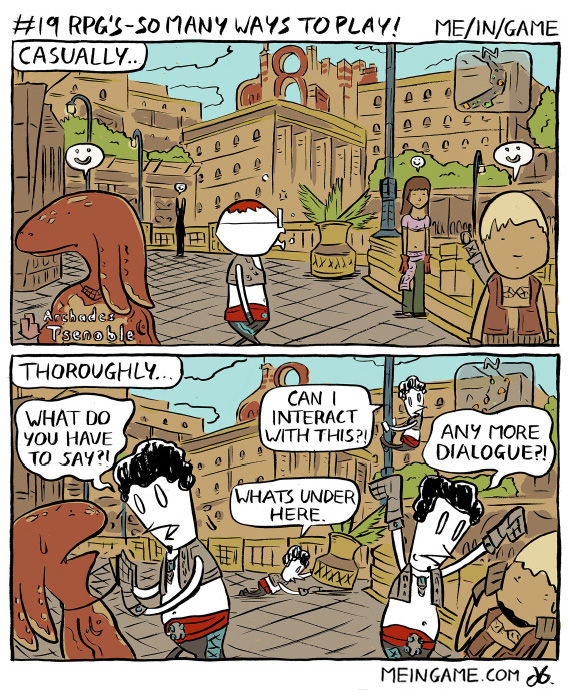This is Part One of an ongoing series of post describing the design of Turing Adventure. You can try the game and vote for it in the Adventure Jam here.
- Part One: Motivation: Feel the adventure
- Part Two: How to push the adventure feeling further
- Part Three: Turing Adventure: Overview and design choices
- Part Four: AIML: The technology behind Turing Adventure
- Part Five: The psychology of human-chatbots interactions
- Part Six: Technical and design difficulties
Motivation: Feel the adventure
There is something somewhat wrong with adventure games.
You play them to live an adventure. Years after you completed a game, you look back and what you remember is you, incarnating the adventure’s hero, penetrating dungeons, confronting monsters and saving the day. Well, this is what it is supposed to happen, and it works. So, what’s the problem? The problem is that the following comic is funny:
Can you imagine Aragorn doing that in the book? Or Indiana Jones when exiting the Temple of Doom? No, that’s wouldn’t make sense. Nevertheless, it is quite accepted in video games.
So the problem is the game mechanic. The game mechanic is fun, but not always supports the history, and thus, do not support the adventure experience. Current game mechanics not only allow the player to behave in unnatural ways for the history, but sometimes encourage it. At the end, they’re fun, and buy gameplay time. But that is not the adventure. The result is a crossover between a casual pastime and an adventure experience, but, guess what: In some years, you will remember the adventure, not the inventory management or the minigames.
Not convinced? Let me give you a clearer example:
If you enjoy and play graphic adventures or computer RPG often, tell me that you don’t play them the thorough way. You won’t, because, well, of course you do. This comic opened my eyes. It made me realize that you are doing it wrong (and me too).
In years to come, when you remember the graphic adventure, you won’t remember going thoroughly through the conversation tree, you’ll remember the adventure. And you’ll remember it as something exciting.
Let’s recap a bit: The game mechanics are fun to play, they increase the gameplay time, and if the story is worth it, you’ll get the memories of living an adventure, ala Total Recall.
Then why do I insist that there’s a problem on it? Because, if not for the game mechanic, you’d have the sensation of living the adventure while you are playing it, not in the future. And that would be definitely be better.
Yes, it is true that you have the sensation of living adventure when something happens, but in the meantime, you have the sensation of solving cardboard puzzles: No dangers, no excitement, no rush… no adventure!
We can do better.


Designing Turing Adventure Part Three: Turing Adventure: Overview and Design Choices
[…] Part One: Motivation: Feel the adventure […]
Designing Turing Adventure Part Four: AIML: The technology behind Turing Adventure
[…] Part One: Motivation: Feel the adventure […]
ugz059
v3ve83
aoj8a5
hgr3tp
4lrwdf
sykiaq
mxyfax
8euim5
is25y1
4yefw7
eyfto3
lstdq9
fxliry
86q5of
lhpudf
ypqlur
xlb0an
tbdy48
h9t0do
as6j7c
uchfe1
odp1vv
qe2d7r
ilm9zg
1v8xbo
9cfzoe
lw0dcs